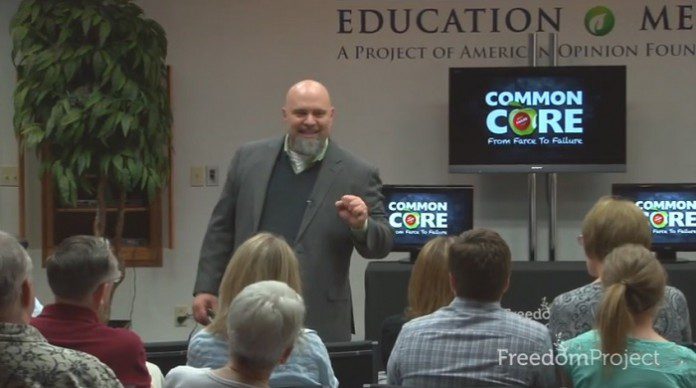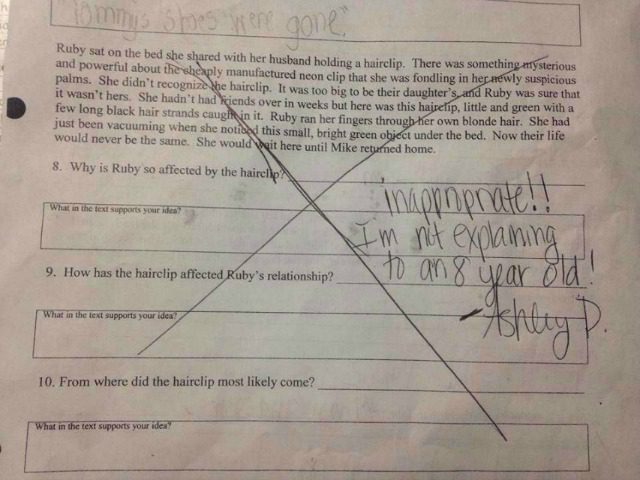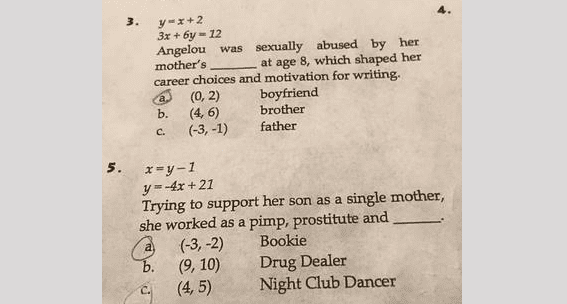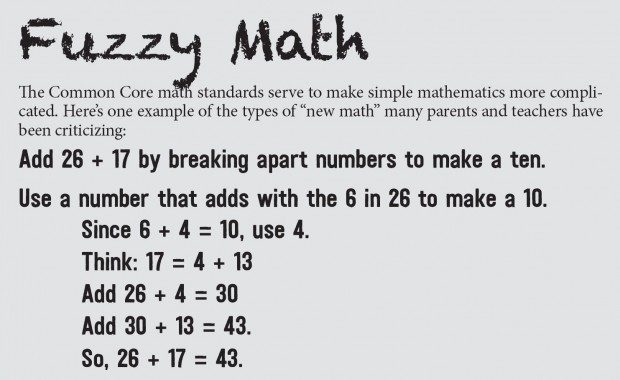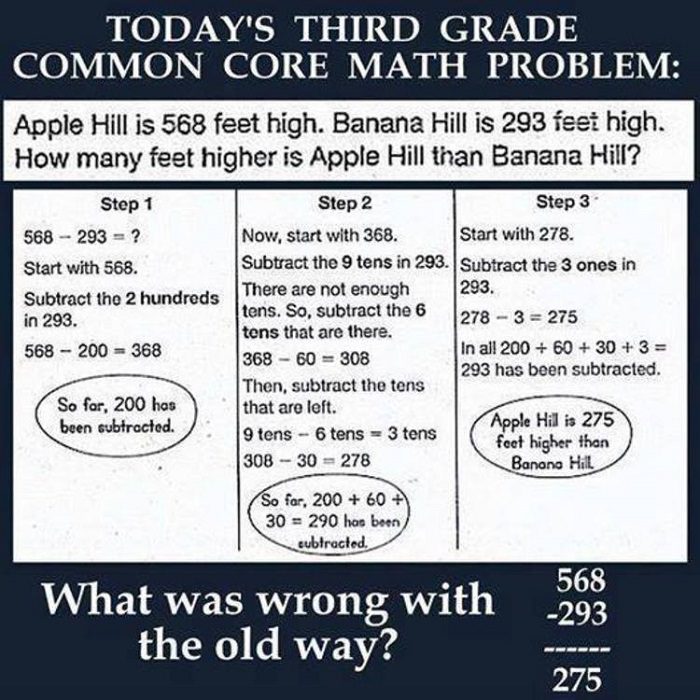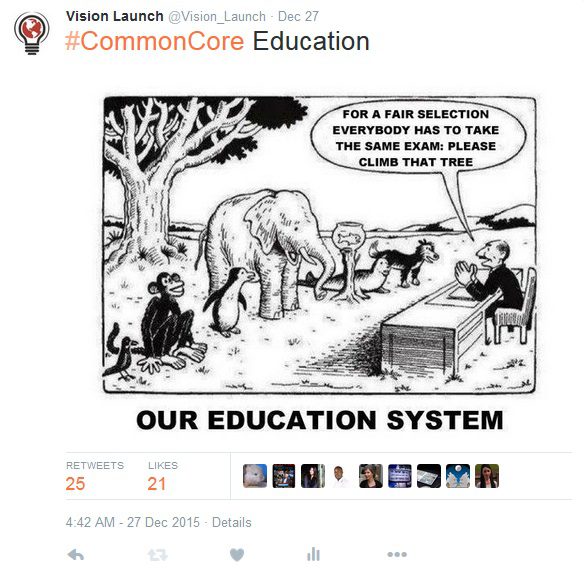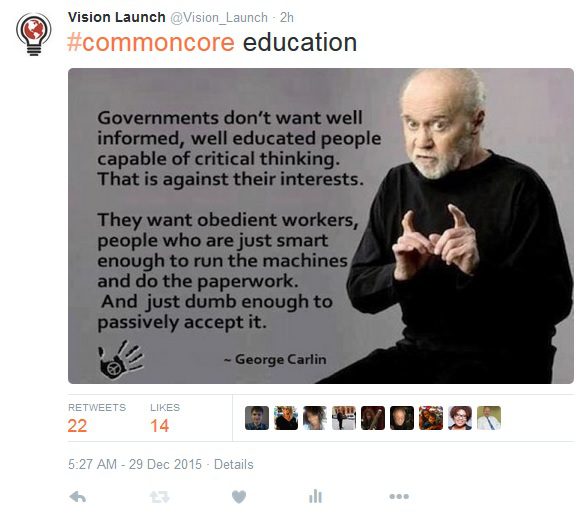Over the past decades there have been many attempts by our government, under Republican and Democrat administrations alike, to further centralize and homogenize the U.S. education system. Establishing Common Core standards and tying their use to federal education dollars is just the latest and boldest incarnation of this now familiar overreach. Like anything the U.S. government gets involved in, we can expect politics and bureaucracy in abundance, and Common Core has been no different.
Common Core was sold to the American people as the solution that would help U.S. students become competitive once again with the rest of the world in the educational basics. Because the initiative was hidden in the economic stimulus package, very little was known about Common Core when it was first introduced. Now that we have seen it in action for the last several years, it is clear that there was more to the program than we were led to believe.
So why has Common Core failed to live up to expectations? For one, what we were told it is and what it really is, are two very different things. Unfortunately, like much of the important legislation passed in Washington today, we can only find out about what’s in it after it passes.
A large part of the opposition to Common Core standards is coming from within the educational system as well as from the American people, because it removes local control over the curriculum. Every school district and teacher is required to follow the same standards. Instead of meeting the unique needs of a child or a community, one set of standards has been put forth as the definitive standards for the education of every American child. It should also be known that the only two experts who were consulted about the qualifications to assess such a program, could not endorse the final Common Core model. What’s more, there have been no studies done proving that Common Core is effective. We are told we will have to wait and see. But for people who have been paying attention, there is no surprise in discovering that the program is doing poorly. Below are some of the problems with the Common Core Education Standards.
The Common Core Architect
David Coleman, in conjunction with a handful of others, is the chief architect of the Common Core standards of education. Coleman openly admits that he and his co-authors have no academic qualifications to create such a far reaching transformational education plan, but apparently, our government felt he was competent for the job. To say that Mr. Coleman’s political leanings are outside the spectrum of the average American’s ideology would be an understatement. It appears that instead of developing solid, relevant educational standards for our children, Mr. Coleman seeks to create change by subtly embedding a viewpoint and force-feeding it to future generations under the guise of education. But his brand of change may not be for everyone. He also tells us how he teamed up with the Obama Administration when creating Common Core and talks about things like advocacy through policy, which appears to come through in his work. Now Mr. Coleman is the president of the College Board, where he is changing the SAT tests much like he did the education system with Common Core. Mr. Coleman thinks the government should be responsible for the future generations of children and that parents”hold back” children’s progress.
Common Core Data Mining
David Coleman gleefully tells us how data gathered through the implementation of Common Core can be exploited to further an agenda, and then goes on to name the factions that have partnered with Obama in these efforts. The Department of Education acknowledges that there are questions of a “sensitive nature” being asked and that much of this information will not be related to education. There are millions of dollars being awarded through federal grants to states that implement data mining in their districts.
Here is the nature of some of the questions:
1. Political affiliations or beliefs of the student or parent
2. Mental and psychological problems of the student or the student’s family
3. Sexual behavior or attitudes
4. Illegal, anti-social, self-incriminating, and demeaning behavior
5. Critical appraisals of other individuals with whom respondents have close family relationships
6. Legally recognized privileged or analogous relationships, such as those of lawyers, physicians, and ministers
7. Religious practices, affiliations, or beliefs of the student or the student’s parent
8. Details of Income.
Why do they need this data? What will be done with this data? If this isn’t a creepy example of Big Brother insinuating himself into our schools, our homes and our private lives, I don’t know what is.
Common Core – Social Engineering or Education?
Common Core replaces traditional literature with what is called “informational text.” Informational text can include EPA regulations, repair manuals or even politically charged information, which critics say revises American historical events. As we seen in some of the information text, there is a strong political ideological message intertwined in the message. There are even politically correct science standards that have been adopted by some states about climate change that critics say are more about indoctrination than education. Education should promote critical thinking by presenting all the available information on a particular topic and encouraging analytical thought and consideration of evidence. Is Common Core about education or political re-education?
Inappropriate Subject Material
Some of the questioning used in Common Core is very inappropriate for our school children. One of the more well-known equations involves how Ruby finds a hair clip that is not hers, insinuating that her husband was cheating on her. It is quite astonishing that this question would be given to a fourth grader. There are many more examples of this type of sexually charged material intertwined within all of courses of Common Core. The New York Common Core website was found to have a web link that led children to an online sex quiz.
Here is another example:
Common Core Math is Confusing at Best
Another criticism against Common Core is the new way it teaches children to solve mathematical problems. Not only does it take many more steps to complete, there can also be several right answers – and correct answers can be counted as wrong if not done using the Common Core method. Common Core focuses more on how math problems are solved, rather than getting the correct answers.
Here is another example:
Common Core standards require that some problems, which we used to solve in two steps, now require over 100 steps in order to be counted as correct. How can it be that a child can supply the correct answer to a math problem but have it marked wrong by the teacher, labeling it not ‘Common Core friendly’ enough? Does that seem like an improvement in math for students?
It Is Remarkably Expensive
Let’s take just two states: Washington and California. The cost to implement Common Core in these two states totals more than $1 billion. If you expand that to a national scale, you’re approaching a figure close to $20 billion.
That’s a lot of taxpayer money going into a system which students, parents, and teachers are all struggling to understand. For a period following its launch in 2009, some initial struggles with the new curriculum were excusable. People needed to adapt to the new learning methods. Yet, as we have moved forward, the confusion hasn’t decreased.
Essentially, the U.S. taxpayer is funding a system of education that is not well understood. If we get upset after having wasted $5 on a toy that breaks, then how does Common Core make people feel since we’ve wasted $20 billion on a broken system?
One Size Fits All Approach Does Not Work
When Common Core was introduced, the idea was to raise the educational standards for U.S. students and this goal was applauded by many. After all, people tend to rise to the level of their expectations. If you set the bar higher, more students will reach that new height. The only problem is that Common Core actually lowered the educational standards in many school districts. Suddenly, students didn’t have to work as hard to achieve passing results. This is especially true when it comes to reading comprehension and mathematics. When implemented, the standards for these two core educational elements was said to be benchmarked based on international standards. Unfortunately, this hasn’t turned out to be the case:
- The mathematics standards for Common Core are set well below that of those implemented in the Asian Pacific region of the world.
- Reading comprehension standards are set well below international standards.
- It has removed many components of the study of English literature from the curriculum.
What are the results? Students only have a fractional knowledge of what the English language is able to provide. They only know basic mathematical structures. Maybe this will be enough for them to get by in their preferred vocational opportunities in the future, but even if this is the case, international students are going to be positioned for better opportunities than U.S. students, thanks to Common Core.
It Has Questionable Legality
Although Common Core has certain standards that are supposed to be met for student performance, the implementation of this system of education contains no such standards or forms of assessment. It contains no formal method for repeal. This is because the federal government offered states a bucket of cash to begin implementing this new educational system. There is no actual law which governs Common Core. This means there is no easy way to rollback what this curriculum is doing to today’s students. States will need to pay back the cash they took from the federal government if they decide that Common Core isn’t for them. Common Core has been costly for states to implement. If you add to these existing costs to additional money that would have to be spent to get out of this system and implement a new curriculum, that amount is larger than most states are willing to spend right now. It isn’t only the implementation of Common Core that has questionable legality, but the data collected by schools borders on the questionable. Is it ok for schools to be able to track certain facts about students that have nothing at all to do with education? Here are just a few of the data points that are being tracked in addition to the report cards that teachers issue:
- Blood type.
- Religious Preference.
- Diversity Awareness.
Since when did an awareness of cultural or ethnic diversity have anything to do with math, reading comprehension, technology, or science when it comes to education?
Experts Consulted Could Not Endorse Common Core
Dr. Sandra Stotsky, who teaches at the University of Arkansas, was invited to review Common Core standards for English. In her own words, she expected to see the curriculum and be able to give it an endorsement. After reviewing what students were actually receiving, however, it became clear to her that teachers were not being given the tools needed to create passion within today’s students. In just one of many examples in Dr. Stotsky’s review of literature offerings given to students, she found that students were given The Recommended Levels of Insulation by the EPA [Environmental Protection Agency] as a method of learning English comprehension. Dr. Stotsky refused to give Common Core her endorsement. Dr. James Milgram, who teaches at Stanford, had a similar issue with the mathematics portion of Common Core. In his words, Common Core makes math “as non-challenging as possible.” Dr. Milgram even found outright mathematical errors being taught in this curriculum. He also refused to endorse Common Core. Why is this notable?
- Because Dr. Stotsky and Dr. Milgram were the only two teachers of specific subjects invited to review Common Core.
- The remaining committee members were general education professionals who had experience in system implementation.
- The educational system specialists endorsed Common Core. The two teachers did not.
As a parent, who would you rather have deciding what your child is taught — real teachers, or administrators who may never have taught anything to anyone in their lives?
Common Core Opposition Crosses Political Lines
In today’s polarized political climate in the United States, you’ll find conservatives and liberals at each other’s throats every day. Politics is ending friendships, dividing families, and creating deep levels of division throughout the country. Yet, when you bring up the subject of Common Core, you’ll find that lots of people from both sides of the fence are coming together to oppose these standards.
The National Education Association has joined large teachers unions in Chicago and New York in their opposition to Common Core. These traditionally liberal groups have been joined by a plethora of similar conservative organizations. Here’s why:
- A primary author of Common Core, David Coleman, is president of the College Board. This is the organization that designs the SAT and SAT results are a primary factor determining college admission. This translates into a requirement that students must be adept at Common Core principles if they want a good college placement. Unless students are being taught Common Core principles, which might be different from their family or religious principles, they are at a future disadvantage.
- Theories are being presented as fact. Ideas about globalization, climate change, and even sexual education that are unproven are being presented to students as if they were fact. If you thought the evolution vs. creationism debate was frustrating, just wait until more parents see what Common Core has students bringing home.
The fact that liberals hate Common Core as much as conservatives do only highlights the fact that adhering to Common Core standards is really is dumbing down America.
It Is Based on Ideas That Are Proven Failures
When you look at many of the elements of Common Core, you find that there is a lot of No Child Left Behind still trying to operate in there. In order to address the needs of individual students, a team develops an Individualized Education Plan (IEP) for the student who is struggling.
On the surface that looks great. When you see what the goal of an IEP tends to be, however, your feelings may be very different. This is because students are given plans that are designed to help them meet curricular standards instead of focusing on their own personal educational gains. Here is why this is a big problem.
- Students with an IEP are often seen as “different.” They are pulled out of their classroom to go to their “group” with other kids. This naturally creates cliques that can last throughout their entire educational career.
- The learning is based on test results instead of personal results. Some groups place more of an emphasis on receiving a parent’s signature on homework than actually teaching students critical information.
- If there isn’t 100% success, then the program is deemed a failure.
We are imperfect, by nature. How can we expect students to learn in one specific way when we are so very different from one another? In the U.S., we used to learn that what makes people different is what makes them better and stronger. With Common Core, there is no individual diversity, which is a bit ironic considering diversity is a trackable metric for student performance.
Expecting every student to be the same has proven to be a failure. No Child Left Behind was proven to be a failure. Common Core, built on these two ideas, will be proven a failure as well.
States with Higher Standards Must Lower Them
Adopting Common Core means adopting the educational standards this curriculum demands. For some states, this means lowering the standards of success for their students. When Dr. Stotsky looked at the requirements for Common Core and compared them to current state standards, she estimated that students would lose about two grade’s worth of learning in some US states.
To put that another way: students with a high school diploma under Common Core are graduating as Sophomores instead of Seniors.
Why is this important to know? Because Common Core will affect future generations. In looking at the positive social interactions of kindergartners, there is a direct correlation in the ability of these young children to positively interact with their peers and the education of their mother.
Just 69% of kindergartners showed positive interactions with their peers when their mothers had less than a high school diploma as their education. Having a vocational or college degree boosts that percentage to 84%.
Just 15% points doesn’t seem like a big difference to some, but let’s take that into the Common Core classroom. Today this means 2-3 students in the average kindergarten classroom that will have negative peer reactions. As Common Core graduates with their Sophomore level education have kids who reach school age, this will statistically increase to 4-6 students per classroom.
Then you need to add in these additional factors.
- 29% of children who live in the bottom 20% of overall household income in the US display negative peer interactions.
- Children in ethnic or racial minority groups are more likely to display negative peer interactions when compared to Caucasian/White students in the US.
- Boys are more likely to be negative in their peer interactions when compared to girls.
More negative interactions mean more disciplinary actions teachers must take. More time in discipline means less time actually teaching. Less time teaching means less time learning.
Common Core becomes a destructive cycle that effectively makes each generation a little dumber than the last. If it continues, the US will become the first developed nation where the next generation is literally guaranteed to be less intelligent than their parents.
In Conclusion
It is difficult to see how the use of Common Core standards can improve our education system. This program seems more like a Trojan horse that looks to further politicize, centralize and dumb down our school system while gaining a strategic foothold in the hearts and minds of our children. Common Core is a path that takes the U.S. education system on a journey destined for further academic deterioration. Many people are waking up to this reality. Even though it has only been implemented for a few years, many states are considering abandoning these educational ideas because there is strong bi-partisan support to find a better way.
Dr. Duke Pesta has been following Common Core since its introduction and has a lot of information to offer on the topic. Here are two parts of an excellent presentation. Here is the full presentation.
Strong proponent of individual liberty and free speech. My goal is to present information that expands our awareness of crucial issues and exposes the manufactured illusion of freedom that we are sold in America. Question everything because nothing is what it seems.







